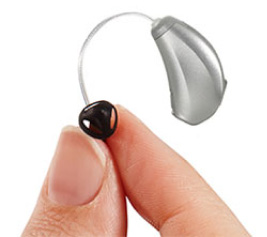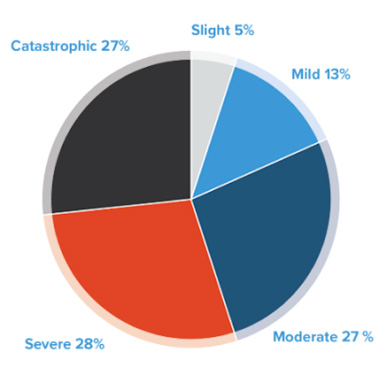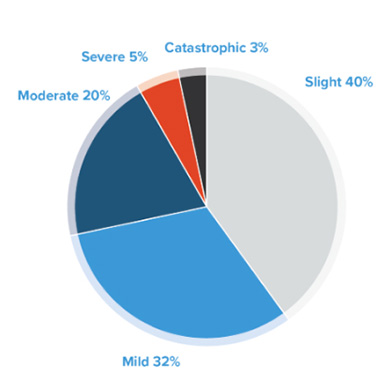
TDT as a retraining therapy provides a bespoke range of therapies that are selected to meet a patient’s personal treatment requirements. We examine the specific psychoacoustic profile of your tinnitus signal to create a tailored therapy package designed just for you. Using this profile, we provide delicate tailored sound therapy to sustainably reduce your awareness of the tinnitus signal. We also provide therapies to help you think differently and reduce the negative emotional response to your symptoms.
The majority of our patients report a decreased awareness of their tinnitus after 10-14 weeks of therapy. See below for the summary of the clinical research.
In simple terms, our therapy is a combination of our expertise and experience, tried and tested techniques and some clever technology.
You can book an initial assessment which will help us establish whether this therapy will work for you. You can do this at a clinic or using our e-consult service we can assess you using a video link from the comfort of your own home. *.
*Due to restrictions due to coronovirus we will confirm details of how we’ll manage your appointment when you book. Not all tests are possible in our e-consult service and we may need to undertake these in clinic when you attend for fitting.

The devices that are used to provide appropriate sound therapy are discreet and comfortable and can be integrated into your daily life. For those who have difficulty sleeping, we can provide a special night-time regime of sound therapy to help make restorative process.
This is a modified variant of Tinnitus Retraining Therapy that utilises bespoke sound therapy provision in order to control tinnitus awareness more effectively with the goal of acting as a catalyst to the neurological filtration process. This method can also be utilised to reduce sound sensitivity and improve hearing acuity in patients with appropriate profiles.
TDT helps patients to take control of the impact that tinnitus is having on their lives with the goal of reducing tinnitus to a burden free state.
The supporting activities which we ask you to engage in will also help you to cope with the day to day emotional impact of your symptoms.
Use our 0% finance option over 6, 12 or 18 months to spread the cost of your treatment; terms and conditions apply.
Treatment packages from £1675. You can pay monthly to spread the cost.
At the initial assessment appointment, your audiologist will have discussed TDT with you and have identified the right device for your personal acoustic tinnitus profile. This sound enrichment therapy is designed to sustainably reduce the focus that you are giving to the tinnitus sounds.
As an independent company we can select the best device for you from all manufacturers. We constantly look for improvements in the devices and may change our recommendation if a better device becomes available.
Tinnitus Desensitisation Therapy™ will work best when you apply the self management programme we plan for you.
This may include relaxation exercises, behavioural therapy or additional sessions of Tinnitus Psychodynamic counselling which has been shown to be especially helpful to those with long standing tinnitus symptoms.
It is also important that you take care of your devices, ensuring that they do not get blocked with wax for example.
At the last appointment of your therapy, we will provide you with guidance on stabilising the improvements that you have made and re-evaluating the prognosis of your tinnitus for the future. Based on your needs, we will offer advice regarding exercise, and food and drink habits related to tinnitus as well as encouraging you to continue with the self management programme we have agreed with you.
*The patient’s severity of tinnitus was measured using the THI international standard method. For further information on the categories of tinnitus click here.
“Tinnitus Desensitisation Therapy for Tinnitus: a review of clinical outcomes in an independent audiology practice setting” by Mark Williams BSc, MSc, Dip CCA, RHAD


As tinnitus becomes more noticeable in a quiet environment, it may affect your sleep patterns: either preventing you from falling asleep or waking you up. If you are anxious about your tinnitus, this can lead to negative thoughts, raised stress levels and changes in behaviour.
In turn, this can make the tinnitus seem more noticeable and intrusive, especially when you are trying to sleep. Sleep therapy involves reflecting on your beliefs about sleep, sleep record, and evaluating those negative automatic thoughts about tinnitus. The counselling process aims to change attitudes to tinnitus, and ultimately improve your sleep quality.
You may have noticed that your tinnitus is worse if you are anxious or tired. The Tinnitus & Hearing Clinic audiologists will teach you relaxation techniques to help reduce the invasiveness of your tinnitus, its effects on your stress levels and everyday life. Our audiologists will train you in breathing and muscle relaxation techniques, and show you how to keep a record of your relaxation exercises.
Behavioural Therapy is a form of treatment for tinnitus that examines how thought processes adversely affect behaviour and how you can change those thoughts. It is a method for reducing the negative emotional reaction to tinnitus and often serve to reduce the associated anxiety. Behavioural Therapy uses relaxation, cognitive restructuring of thoughts, and uses situational examples to help improve your feelings about your tinnitus
If you have further questions about Tinnitus Desensitisation Therapy™, please take a look at our Patient Stories or contact The Tinnitus & Hearing Clinic.